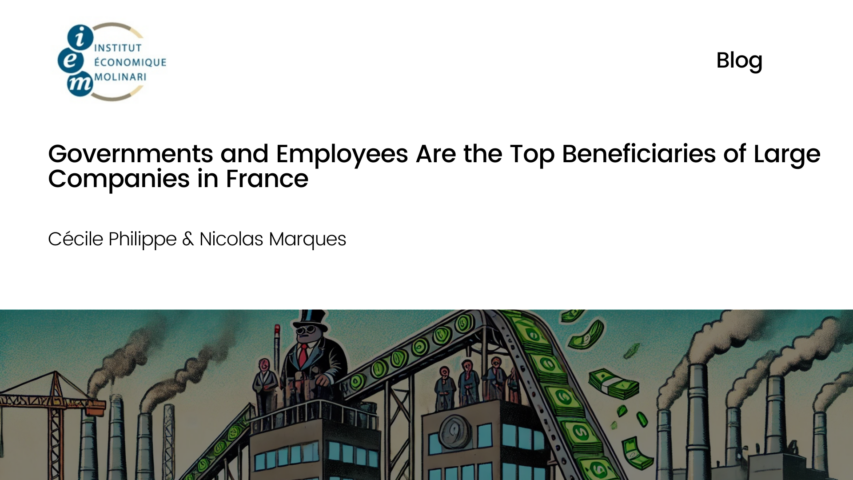Governments and Employees Are the Top Beneficiaries of Large Companies in France

Governments and Employees Are the Top Beneficiaries of Large Companies in France
Cécile Philippe & Nicolas Marques // 15 May 2019
For as long as capitalism has existed, debate has flourished between those who challenged its rise and those who sought to alter its direction or simply to take advantage of its existence. Questioning business’s contribution to society has become a recurrent theme. A certain economic populism is leading increasingly to major employers being denounced and accused of various evils: they are not ‘sharing’ profits and are favouring dividends over investment, thereby generating abnormal shareholder enrichment. However, a new study published by the Institut économique Molinari shows that the CAC 40 companies created €373 billion in wealth for France and the global community in 2018. Employees are the greatest beneficiaries, with €265 billion in wealth, followed by French and foreign governments (€72 billion) and shareholders (€36 billion).
Companies have the ability to put together an ecosystem that joins employees, senior managers, banks, lenders and subcontractors, governments and shareholders. They are a key link in the creation and sharing of value between stakeholders.
These questions of fairness have arisen in the last few years. In many European countries, persistent public deficits and a sharp upswing in debt are creating tensions between those who favour higher taxes and those who advocate more lenient taxation. These tensions are especially significant in countries such as France, characterised by the persistence of high public deficits together with severe tax pressure.
Some people see business as behaving like a stowaway, benefiting from the services provided by governments and public administrations while balking at participation in their funding. Business is also accused periodically of not paying enough in taxes while maximising tax credits and practising tax optimisation.
In fact, business contributes significantly to the common good. The social and fiscal contribution from large companies in France and worldwide remains largely unrecognised. Traditional accounting and financial presentations do not consider the externalisation of the creation of value for the broader community. Devised to present corporate earnings, they focus on financial data and understate the benefits for the wider community while overstating shareholders’ income by presenting dividends before taxes.
With a new way of quantifying the wealth created by the CAC 40 companies, we show that employees are the top beneficiaries of this wealth creation, with €260 billion in staff expenditures (wages, bonuses, compulsory and optional social protection, etc.), €4 billion in employee savings and share ownership and €1 billion in dividends. Governments are the second greatest beneficiaries, with €29 billion in taxes on production, €33 billion in corporate income taxes and €10 billion in taxes on dividends. Shareholders follow behind employees and governments. They are the third-ranking beneficiaries, with €36 billion in dividends (net of taxes and dividends paid to employees). Far from grabbing most of the profits, they take part in a collective wealth creation chain accounting for €373 billion in France and abroad.
In comparison to the previous edition, covering 2016, the CAC’s fiscal and social contribution was up 10% to €373 billion. Governments were the top winners (+14%), followed by employees (+10%) and shareholders (+2%). This dynamic results from much faster growth in corporate tax revenues (+20%) and personnel costs (+11%), while dividends net of corporate tax stagnated.
If we focus only on the profits before taxes, governments appear to be the top beneficiaries (€43 billion), followed by non-government, non-employee shareholders (€36 billion) and then by employees (€5 billion).
Because the social and fiscal contribution of large companies, in France and worldwide, remains largely unrecognised and unknown, public debate focuses on the wrong data concerning shareholders. This is both deceptive and unfair, but also counterproductive because it distracts from the more serious issues affecting society. France has many issues to solve such as pension and healthcare reforms. The sharing of shareholder earnings is not one of them.
EPICENTER publications and contributions from our member think tanks are designed to promote the discussion of economic issues and the role of markets in solving economic and social problems. As with all EPICENTER publications, the views expressed here are those of the author and not EPICENTER or its member think tanks (which have no corporate view).



